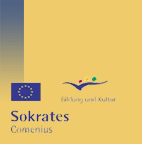Topic
of the Set of Activities: The Cassette Recorder
References
to the Didactical-Methodical Planning of the Set of Activities
Children
have a natural interest in the technical phenomena which surround them. In
everyday life they handle many electrical devices and electronic toys without
understanding their technical functions. They play with magnets, which possess
mysterious forces for them: they can attract and repel objects - by magic! They
see that electricity produces light and assume that the socket is the never
ending source of this marvelous phenomenon. Frequently children also try to get
to the bottom of things by asking questions and by examining electrical
devices, taking them apart and looking at their components.
The
following set of activities takes the childrens natural curiosity as a
starting point. Our aim is to de-mystify seemingly marvellous mechanisms and to
make them accessible for children. This set uses a medium which is still
popular with children. In early infancy the majority of children already
possess a handy, convenient, and colourful cassette recorder which usually
accompanies the children everywhere and which is equally suitable for recording
and listening.
The
individual activities set up is based on childrens natural curiosity. In
conveying physical-technical contents one point of crucial importance is to
make children learn holistically by appealing to all their senses.
Exploring-discovering learning is the fundamental
didactical
principle. By trying, acting, experimenting and using, the children shall not
only get to know the medium cassette recorder from a technical perspective, but
the physical bases (such as sound, magnetism, electromagnetism and electricity)
shall also become understandable for the children by experiencing them in a
concrete way.
The set
of activies is conceived for children of 5 years or older. For younger children
the individual activities would have to be even more didactically reduced. The
individual units of the set (sound, magnetism, electromagnetism, loudspeaker,
cassette recorder, electricity) can also be worked on in other contexts or in
another order: Here the individual situation and the respective interest of the
specific group of children should be considered and used as a starting point
for individual plans. The experiments and materials can be varied and repeated
in free play.
Overview
of the set of activities:
Activity1: Hear, produce
and feel tones / noises
Activity 2:Sound can
be bundled
Activity 3: A tone /
sound is a wave! Sound can be made visible, sound can make objects move!
Activity 4: Magnetic
and non-magnetic materials
Activity 5: The earth
is a large magnet - magnets repel and attract each other
Activity 6: Building a
compass
Activity 7: Magnetism
penetrates materials
Activity 8: Flowing electricity: Set up an electric
circuit run with the help of a battery
Activity 9: Electricity
can magnetize objects made of metal: Building an electromagnet
Activity 10: Examination
of a loudspeaker: How does it look and what does it consist of?
Activity 11: Examination:
How does a cassette recorder work?
Download of the activity-set: cassette.zip
Contact:
Richard-von-Weizsäcker-Berufskolleg,
Lüdinghausen/Germany
Rvw-bk-lh@kreis-coesfeld.de











